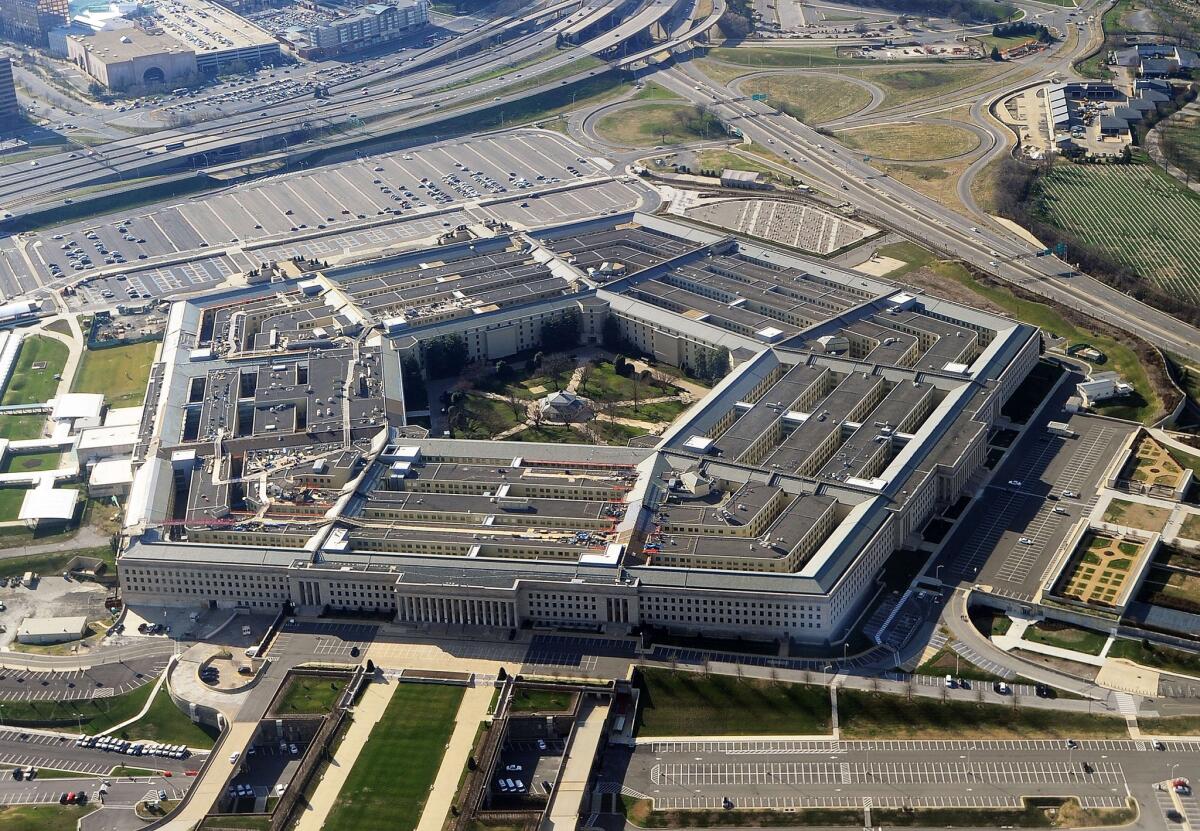Pentagon bars University of Phoenix from recruiting on military bases

The Pentagon in Washington on Dec. 26, 2011.
- Share via
Reporting from Washington — The Pentagon has temporarily barred the University of Phoenix from recruiting students at U.S. military bases and cut off tuition assistance for new active-duty troops — a blow to the nation’s largest private university.
The move comes as the for-profit college giant, one of the largest recipients of military education benefits, faces inquiries from the U.S. Federal Trade Commission and California Atty. Gen. Kamala Harris related to university recruitment of military personnel.
The for-profit college industry has faced scrutiny from state and federal regulators in recent years amid evidence of aggressive recruiting, high costs and poor student performance. President Obama and members of Congress have called particular attention to the industry’s targeting of the military, which provides a crucial source of revenue for schools facing tough regulatory requirements.
The Pentagon decision does not affect benefits under the GI Bill, a larger program administered by the U.S. Department of Veterans Affairs, but advocates said the sanctions should heighten pressure on that agency.
The U.S. Department of Defense, which oversees the Tuition Assistance Program for active-duty military, provided limited information about the reasons for the probation. The Apollo Group, which owns the University of Phoenix, said in a filing released Friday that the sanctions were related to the university’s sponsorship of “various events at military installations” without the proper approval and the distribution of so-called challenge coins without trademark approval.
Challenge coins are small medallions with emblems of military units that are given by commanding officers as tokens of appreciation or to promote morale.
The Defense Department sent a letter to the University of Phoenix on Wednesday saying that “the frequency and scope of these previous violations” was “disconcerting.” The letter noted that the university had corrected the issues, however. The department also cited the inquiries from the Federal Trade Commission and Harris’ office.
University of Phoenix President Tim Slottow said the school had been working closely with the Defense Department and found it “troubling” that the agency used the other federal and state inquiries as grounds for the probation.
“The university intends to continue its cooperation with federal and state agencies to respond to their requests,” he said. “We will continue to hold ourselves to the highest standards of accountability, transparency, ethics and compliance.”
Dawn Bilodeau, chief of the Defense Department’s voluntary education programs, said in a written statement that university recruiting activities — such as job training or career events — are banned from Defense Department installations.
Military benefits are an important source of revenue for for-profit colleges, which historically have struggled to comply with a federal student-aid regulation known as the 90/10 rule. The rule — which requires for-profit schools to derive at least 10% of revenue from non-federal sources — is a cost and quality-control measure. It ensures that schools do not operate solely on federal financial aid.
But military benefits such as the Defense Department’s tuition-assistance program and the GI Bill are not counted as federal funding.
Federal lawmakers and advocates argue that policy has incentivized for-profit colleges to target active-duty military personnel and veterans in order to comply with the rule. Bills that would count military benefits on the federal side of the equation have stalled in Congress.
For-profit colleges took in about 40% of the $8.2 billion disbursed under the latest version of the GI Bill from 2009 to 2014, according to a Times analysis of federal government data. And the industry took in 46% of the $538 million in military tuition assistance given out in 2014, according to federal data.
The University of Phoenix noted in its government filing that it had responded to complaints from the government. The university had “immediately discontinued the use of challenge coins” in July after the Defense Department raised objections, according to the filing. The company said it has discussed the military base approval issues with the Defense Department and noted that all prior events “had been approved by base officials and were conducted pursuant to written agreements.”
The Defense Department gave the University of Phoenix 14 days to respond to the probation and noted in the letter that it was considering revoking the school’s participation in the tuition-assistance program. Military members who are enrolled in university courses can continue to receive tuition assistance, but new enrollees or transfers will not be allowed.
Sen. Richard J. Durbin (D-Ill.), a frequent critic of for-profit colleges, had called on the Pentagon to investigate the University of Phoenix after a report by the Center for Investigative Reporting this summer about the school’s recruitment of service members and veterans.
On Friday he sent letters to the U.S. Department of Education and the VA requesting they review the Defense Department’s findings and “take appropriate action to protect veterans and federal taxpayer dollars.”
A VA spokesman said the agency is reviewing the matter.
Military advocates said the recruiting ban at military bases is a significant move by the Pentagon.
“It starves the beast,” said Paul Rieckhoff, president of Iraq and Afghanistan Veterans of America. “It greatly hampers their ability to recruit on post. And that’s their strategy: Get these guys and gals while they’re still on active duty.”
Rieckhoff said the University of Phoenix is “consistently the single worst actor” among for-profit colleges, based on complaints his group fields from soldiers and veterans.
Ryan Rauzon, a University of Phoenix spokesman, said the company disagrees with that assessment and would like to meet with Rieckhoff to demonstrate the school’s “commitment to compliance.”
As the largest player in the industry, the University of Phoenix has been one of the biggest beneficiaries of both programs. Over the years, the school has brought on retired military leaders, including U.S. Army Major Gen. James A. “Spider” Marks and Col. Garland Williams.
The government has paid the University of Phoenix more than $1.2 billion in GI Bill tuition payments since 2009, making it by far the largest recipient. The school was the fourth-largest recipient of Defense Department tuition-assistance funding in 2014, taking in more than $20 million, according to federal data.
Joseph Wescott, head of the National Assn. of State Approving Agencies, which oversees schools receiving GI bill funding, said state authorities will target University of Phoenix campuses in inspections next year. They will especially be looking at recruiting practices, he said.
chris.kirkham@latimes.com
jim.puzzanghera@latimes.com
alan.zarembo@latimes.com
More to Read
Inside the business of entertainment
The Wide Shot brings you news, analysis and insights on everything from streaming wars to production — and what it all means for the future.
You may occasionally receive promotional content from the Los Angeles Times.













